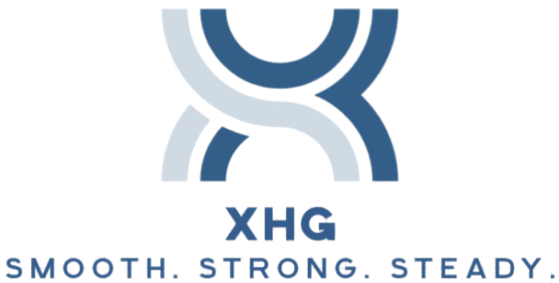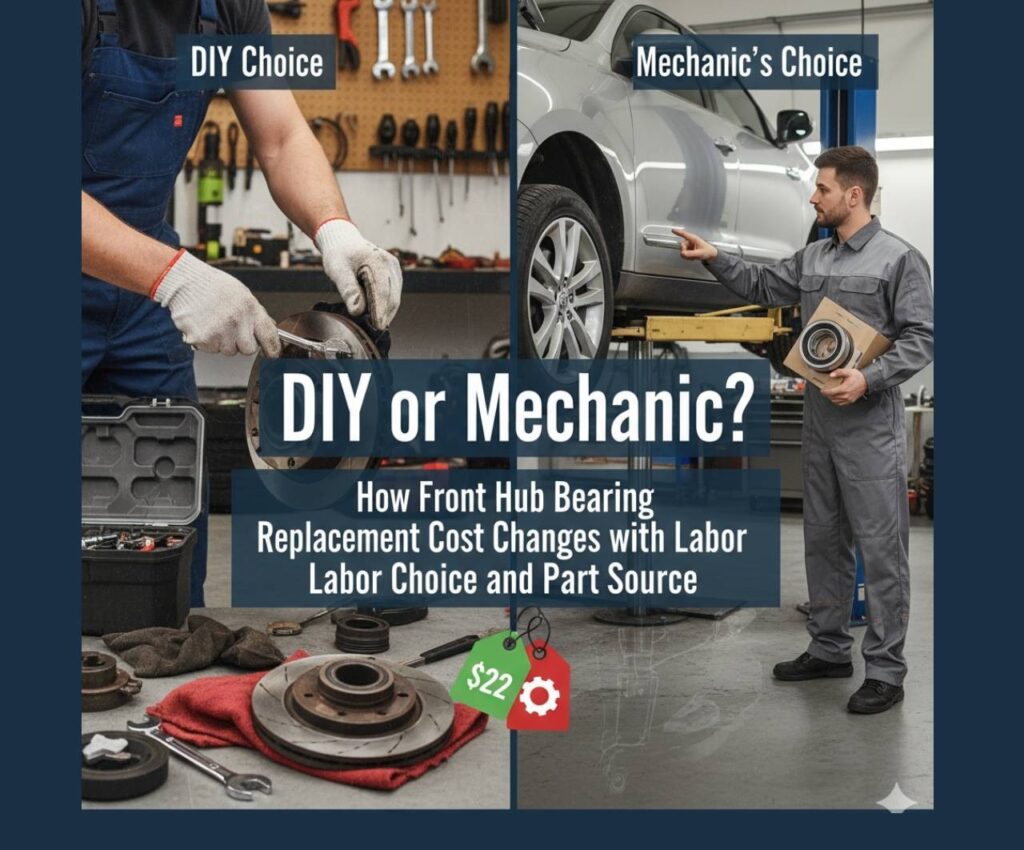If you’re hearing that familiar growl or feel a vibration in your steering wheel, you’re probably dealing with a failing front wheel bearing. When it’s time for a replacement, many vehicle owners find themselves asking the same questions: Should I do it myself or hire a mechanic? How much does it really cost? Understanding the difference between front hub bearing replacement cost, total hub and bearing replacement cost, and full wheel bearing and hub assembly replacement cost is critical for making a cost-effective decision. From labor rates to part sourcing, this guide breaks down where your money goes—and where you can save.
Whether you’re a seasoned DIYer with a fully stocked garage or a cost-conscious driver looking to avoid unnecessary shop fees, this article helps you navigate the financial side of hub and bearing service with clarity. Know More
The Basics: What Is a Front Hub Bearing and Why Replace It?
Your vehicle’s wheel bearing and hub assembly is responsible for smooth wheel rotation and supporting the vehicle’s weight. Over time, these components wear out due to heat, friction, and load. A worn bearing can cause:
- Humming or grinding noises
- Uneven tire wear
- Poor alignment or handling
- Safety hazards at higher speeds
When that happens, the only real fix is a hub and bearing replacement—and that’s where cost becomes a major factor.
Front Hub Bearing Replacement Cost: What to Expect
The front hub bearing replacement cost can vary widely depending on:
- Vehicle make and model
- Front-wheel, rear-wheel, or all-wheel drive
- Labor costs in your region
- Whether you DIY or use a mechanic
- The source and quality of replacement parts
Let’s break down the typical costs for both DIYers and shop repairs.
DIY Cost Breakdown
| Component | Estimated Cost Range |
| OEM-quality hub and bearing kit | $75 – $250 |
| Basic tool rental or purchase | $25 – $100 |
| Grease, cleaner, shop supplies | $10 – $20 |
| Total DIY Cost | $110 – $370 |
If you already own tools like a torque wrench or hub puller, your cost could be lower. However, installing a new wheel bearing and hub assembly requires mechanical knowledge and attention to torque specs—mistakes can lead to repeat repairs or safety issues.
Mechanic Labor Cost Breakdown
| Service Area | Labor Rate per Hour | Time Estimate | Labor Cost |
| Urban shop | $110 – $180 | 1.5 – 2 hours | $165 – $360 |
| Rural shop | $70 – $100 | 1.5 – 2 hours | $105 – $200 |
Add parts (typically $100–$300), and the full front hub bearing replacement cost at a shop can range from $250 to $650 per wheel depending on the vehicle and location.
Hub and Bearing Replacement Cost: The DIY vs. Mechanic Debate
The key cost driver for the average driver is labor. A shop typically charges more per hour than the value of most OEM hub and bearing kits. However, DIY isn’t always the right answer.
DIY Pros:
- Save up to 50% on hub and bearing replacement cost
- Learn more about your vehicle
- Choose exactly which parts and brands to install
DIY Cons:
- Requires specialty tools (torque wrench, press, hub puller)
- Higher risk of improper installation
- No labor warranty
Mechanic Pros:
- Professional expertise and warranty on labor
- Time-saving
- Proper diagnostics and alignment available
Mechanic Cons:
- Higher wheel bearing and hub assembly replacement cost
- Limited control over parts used (unless you bring your own)
- Shop markup on parts and labor
If you’re comfortable working on brakes or suspension components, the DIY route can be rewarding. Otherwise, a trusted shop may be worth the extra investment.
What Makes Up the Wheel Bearing and Hub Assembly Replacement Cost?
This is where many people get confused. The wheel bearing and hub assembly replacement cost includes:
- The sealed unit: Includes wheel bearing, hub flange, and sometimes ABS sensor ring.
- Labor: Removing the wheel, caliper, rotor, and hub; pressing in the new unit.
- Shop materials: Grease, fasteners, and cleaning supplies.
- Warranty overhead: Shops build in a margin to cover liability.
It’s important to recognize that modern vehicles often use sealed hub assemblies, meaning the bearing cannot be replaced separately—raising the price, but lowering long-term maintenance.
How Part Source Impacts Cost (and Quality)
Choosing where to buy your hub assemblies or bearing kits can significantly affect the hub and bearing replacement cost.
OEM/Dealer Parts:
- Cost: $200–$400 per hub
- Pros: Guaranteed fit and function
- Cons: High price markup
Aftermarket Brands:
- Cost: $75–$200 per hub
- Pros: Good balance of cost and quality
- Cons: Requires research to avoid cheap imports
Wholesale/OEM Suppliers (like us):
- Cost: $50–$150 per unit (volume pricing available)
- Pros: Certified quality, bulk availability, direct support
- Cons: Some parts may require cross-reference or verification
By sourcing parts from a trusted OEM wholesale supplier, both DIYers and shop owners can dramatically lower the wheel bearing and hub assembly replacement cost while maintaining quality.
When to Replace Both Sides
While technically you can replace just one wheel bearing, it’s often wise to replace both left and right sides, especially if:
- The vehicle has high mileage
- Both sides have equal wear
- You want to save on future labor
Yes, this raises the immediate front hub bearing replacement cost, but it reduces downtime and long-term service expenses.
Preventing Future Failures: Maintenance Tips
The best way to reduce future hub and bearing replacement cost is to extend the lifespan of your current parts. Here’s how:
- Avoid deep water or high-pressure washers near hubs
- Use high-quality grease and proper seals
- Don’t overload the vehicle or trailer
- Pay attention to alignment and suspension issues
- Tighten lug nuts to factory torque specs
Real-World Cost Scenarios
Let’s look at a few sample scenarios to understand how costs play out.
DIY Compact Sedan (Toyota Corolla)
- Parts: $120 (quality aftermarket kit)
- Tools: Already owned
- Total: $120–$150
Mechanic – Midsize SUV (Ford Explorer)
- Parts: $250 (shop-supplied)
- Labor: $180
- Total: $430–$500
DIY Light-Duty Pickup (Chevy Silverado)
- Parts: $160
- Tool rental: $40
- Total: $200–$220
As you can see, the DIY route can save $200–$300 per job—but only if done correctly.
Final Thoughts: Cost-Smart Decisions Begin with Understanding
Whether you’re a hands-on vehicle owner or prefer to leave it to the pros, knowing the variables behind the front hub bearing replacement cost, hub and bearing replacement cost, and wheel bearing and hub assembly replacement cost empowers you to make the smartest financial decision.
- For those with tools and confidence, DIY can be a satisfying and affordable option.
- For time-sensitive or high-end vehicles, professional service ensures peace of mind.
- In both cases, sourcing parts from a trusted OEM supplier can reduce costs without compromising safety or performance.
Looking for high-quality, affordable wheel bearing and hub assemblies? As an OEM-certified supplier, we offer premium-grade parts at wholesale pricing—perfect for DIYers, auto shops, and fleet managers. Contact us today for bulk discounts, part cross-references, and tech support. Know More

